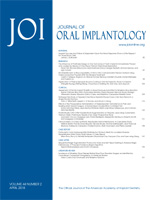[ad_1]

Journal of Oral Implantology Volume 46 Issue 6
Questionnaires such as the ones in this study are important tools clinicians can use to augment their treatments for oral rehabilitation. One author of the study, Elena Dellepiane, emphasized that “The final goal of our clinical activity is the health and the well-being of our patients.”
LAWRENCE, Kansas (PRWEB)
February 15, 2021
Journal of Oral Implantology – Broken or missing teeth can decrease quality of life by interfering with a patient’s chewing ability and self-esteem. Full-arch rehabilitation is a popular procedure used to restore dental function and esthetics. Typically, current studies evaluate clinical parameters including implant survival rates, bone resorption, and tissue inflammation to assess treatment success. However, growing research suggests that patient quality of life and satisfaction are also important outcomes. A recent study in the Journal of Oral Implantology developed questionnaires to assess patient-centered outcomes after full-arch rehabilitation with implants and prosthetics.
Researchers from the University of Genoa and the University of Italy selected a group of 25 patients (10 men and 15 women), of which each was clinically evaluated and underwent tomography to determine implant placement. The Columbus Bridge Protocol was used for the full-arch rehabilitation and implant placement, followed by prosthetic placement 24 hours later. The self-administered questionnaires, developed by using the Oral Health Impact Profile questionnaire as a guide, were answered four times (pre-surgery, 1 week, 2 months, and 4 months post-surgery) to evaluate patient satisfaction and quality of life. At the end of the study, all implants were stable and functioning and did not need to be replaced. Most patients also reported a significant improvement in their quality of life. Specifically, smile confidence improved from 60 to 92 percent and chewing ability increased similarly.
Additionally, the authors highlight that previous anecdotal studies show a high degree of patient satisfaction with full-arch rehabilitation. However, these studies only include questionnaires before and after surgery or only after surgery. The authors of this study included intermediate evaluations (1 week and 2 months post-surgery) and revealed that that patients were unhappy with phonetics during the stages of healing. The authors suggest that perhaps this is due to patients becoming acclimated to their new prosthetics.
Questionnaires such as the ones in this study are important tools clinicians can use to augment their treatments for oral rehabilitation. One author of the study, Elena Dellepiane, emphasized that “The final goal of our clinical activity is the health and the well-being of our patients.” Therefore, simply using clinical parameters, such as implant survival and retainment, may miss important areas of the treatment that need improvement.
Full text of the article “Oral Health-Related Quality of Life and Full-Arch Immediate Loading Rehabilitation: An Evaluation of Preoperative, Intermediate, and Posttreatment Assessments of Patients Using a Modification of the OHIP Questionnaire,” Journal of Oral Implantology, Vol. 46, No. 6, 2021, is available at https://doi.org/10.1563/aaid-joi-D-19-00040.
###
About the Journal of Oral Implantology
The Journal of Oral Implantology is the official publication of the American Academy of Implant Dentistry and of the American Academy of Implant Prosthodontics. It is dedicated to providing valuable information to general dentists, oral surgeons, prosthodontists, periodontists, scientists, clinicians, laboratory owners and technicians, manufacturers, and educators. The JOI distinguishes itself as the first and oldest journal in the world devoted exclusively to implant dentistry. For more information about the journal or the society, please visit http://www.joionline.org
Share article on social media or email:
[ad_2]

